How To Install Replacement Led Recessed Lights
How to Install Low-Profile LED Lights in Your Kitchen
Transform your kitchen into a identify yous'll love to exist with this innovative lighting project.
Every editorial product is independently selected, though we may be compensated or receive an affiliate commission if you buy something through our links. Ratings and prices are authentic and items are in stock as of time of publication.
![]() Time
Time
A one-half mean solar day
![]() Complication
Complication
Intermediate
![]() Price
Price
$150 - $400
Introduction
Transform your kitchen into a place yous'll love to be with this innovative lighting project.
Tools Required
I've tackled several kitchen projects over the years, but I've never made such a major improvement with so little fourth dimension and money. I spent less than $350 and just four hours brightening our kitchen. My original intent was strictly practical: I just wanted ameliorate light to make nutrient prep and cleanup easier. Only replacing the single fixture with vivid LEDs transformed the room, surprising me and amazing our guests.
LOW-PROFILE LEDs MADE IT Piece of cake
Initially, I thought I'd install recessed can lights for a sleek look and lots of lite. Then, I ran across these ultra-slim Halo LEDs by Eaton. These LED lights are super bright (900 lumens) and have such a low contour (less than 1/ii in.) that y'all tin can even locate them directly under a joist if needed. They're rated for insulation contact and moisture locations, then y'all can utilise them in a shower or fifty-fifty outdoors. A switch on the side of the box lets you lot accommodate the colour temperature. They're besides dimmable.
All yous need is a power supply, a ways to cutting round holes, xiv-2 NM-B cable, basic electrical tools and a drill. The transformer box converts 120V to low voltage, and it's UL-listed equally a junction box with room for power in and power out. That lets you have ability from the first box and string together as many lights as you desire. You might need to fish wire, but aside from that, installation is piece of cake. Several companies make a similar product, but this was in stock at the local home center.
PLANNING THE JOB
If you accept an attic above, you tin admission the joists from there instead of working from beneath as I did. That simplifies fishing wires, but you'll still have to dig through insulation. Earlier starting the job, remove the ceiling fixture and await inside the junction box. My box had just one incoming cable. If your box contains more than cables, wiring volition exist a scrap more than complicated. Yous may need to install a 2d junction box because the box for these LED fixtures can house only two 14-2 cables. I replaced the existing fixture with an LED similar all the others.
If you desire a standard fixture in the center of your ceiling, y'all'll still have to remove the existing junction box (Photograph two) to admission the joists. Then, afterwards installing the new lights, install a remodeling box in the same hole. I found everything I needed at a dwelling center. Ii special tools made the project much easier: an adjustable drywall circumvolve cutter and a 54-in. flexible drill bit.
Project step-by-stride (12)
Footstep 1
Lay out the new low-cal locations
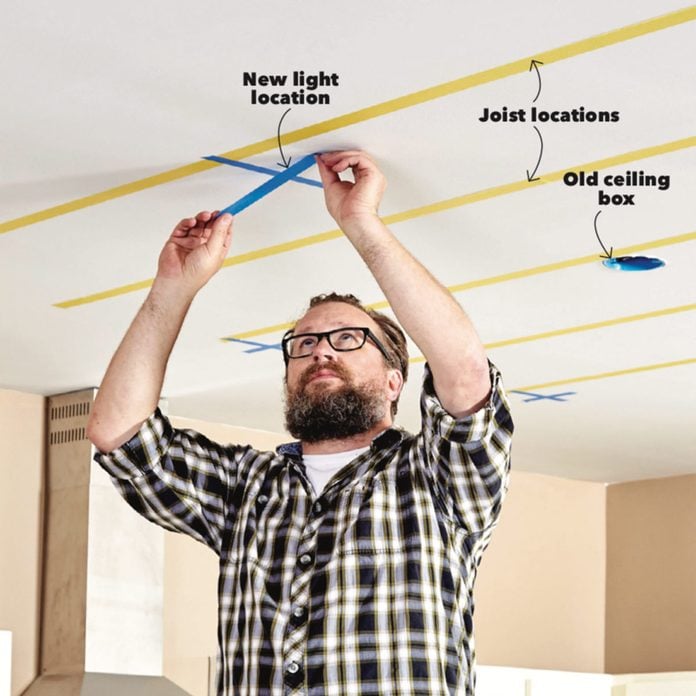
Mark all the joists involved in the installation using strips of tape. Then marker the location for each new light with record. The lights can become anywhere, but I kept them shut to the joists to get meliorate access for attaching the transformer boxes to the joists.
Step 2
Remove the former ceiling box
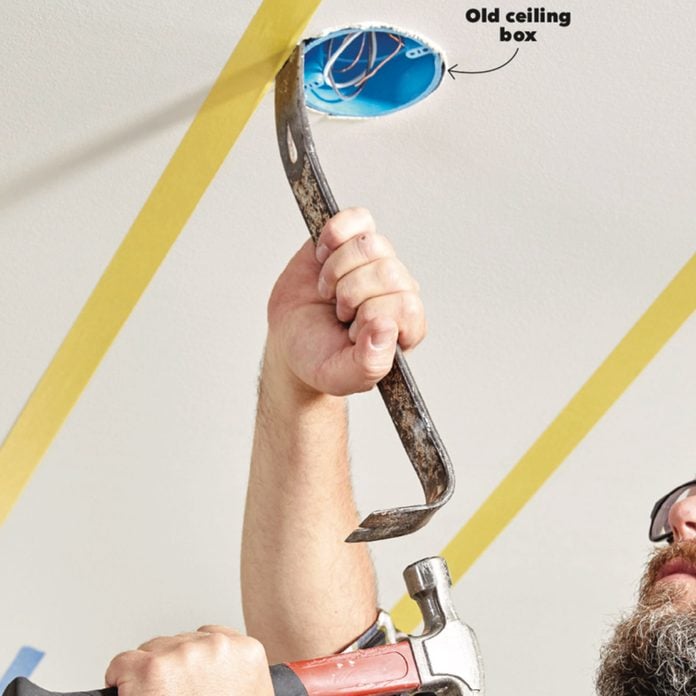
Close off power to the fixture at the breaker panel. Utilise a noncontact voltage detector to verify that there's no current, and and so pull out the old ceiling box. Depending on how the box is attached and what it's made of, this may entail different methods. For instance, you could break a fiberglass box to remove it. Ours was a plastic box, nailed to the joists, and so I was able to pry it out.
Step three
Cutting new holes

Cutting all the holes for the new lights. This adaptable drywall circle cutter (above) slices out perfect holes, saving lots of time. It includes a pan to catch the dust. Only it tin can't exist used to enlarge the existing hole that held the old box. For that, trace the provided template and cut information technology out using a manual drywall saw. Now it'southward fourth dimension to fish wires.
Footstep 4
Drill through the first joist
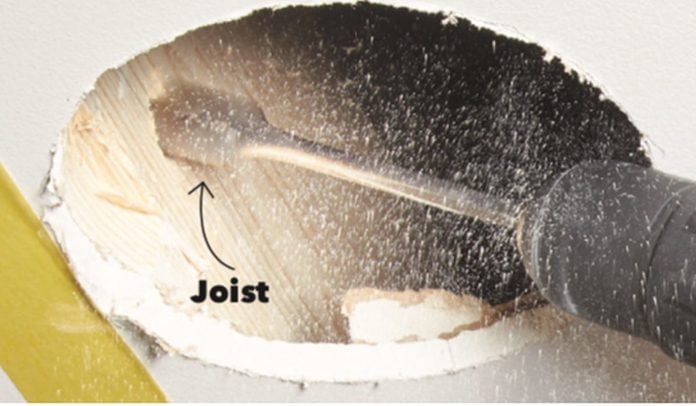
Drill through the joist at to the lowest degree two in. from its bottom edge. I drilled a 1-in.-diameter hole here to make it easier to maneuver the long, flexible bit in the adjacent stride. If you're but going through ane joist, you won't need the flexible bit.
Step 5
Drill through the next joist
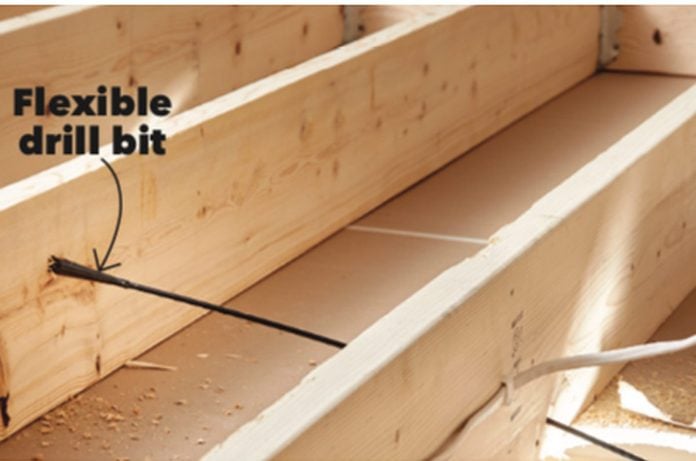
Laissez passer a flexible bit through the hole y'all just drilled until it hits the side by side joist. Flex the bit downward to get close to the eye of the joist. Unless y'all have access from in a higher place, this is guesswork. Drill through the joist, and then loosen the drill's chuck and ready the drill aside, leaving the flake in the pigsty.
Step 6
Fasten cable to the drill bit
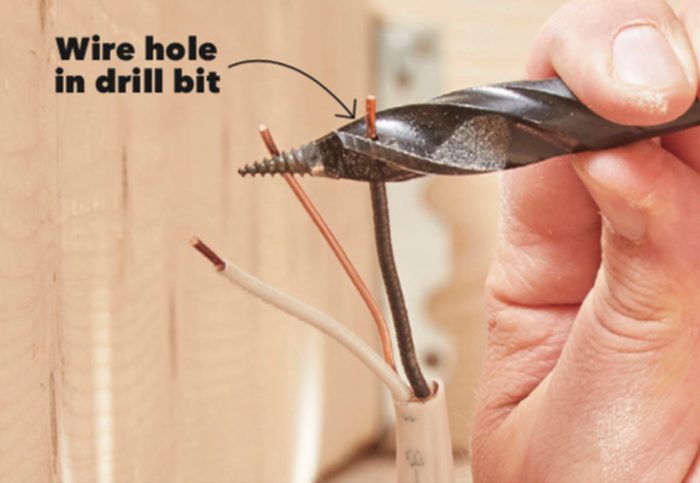
Run 1 of the wires from a new cable through the hole in the fleck's tip and curve information technology over. Twist the other wires together and wrap everything with electrical tape.
Footstep 7
Pull in the new cable

Pull the scrap dorsum through the pigsty along with your new cable, and then unwrap the tape. Each lite cutout (except the last one in the concatenation) requires two cables: power in and power out. As you're running wire from hole to hole, leave plenty of extra length. Information technology'll be much easier to make the connections.
Step eight
Connect power to the transformer
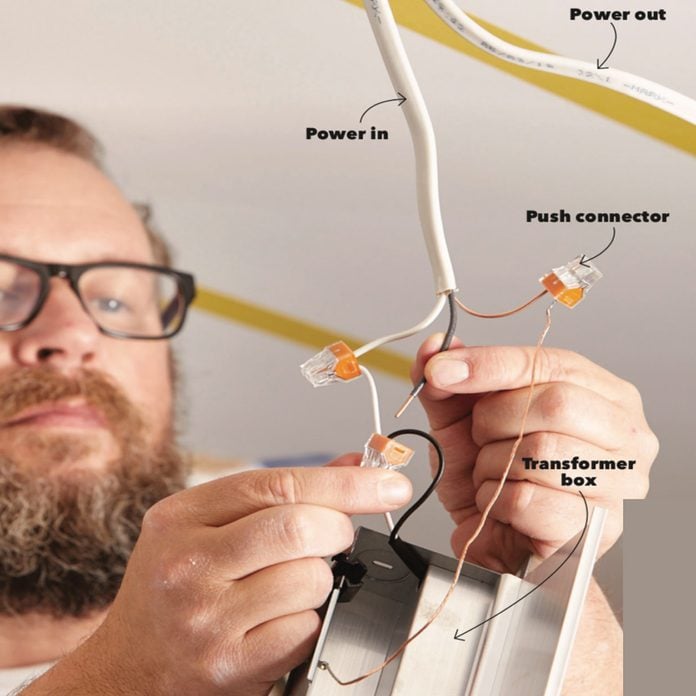
Connect the power source to the first transformer box. Connect your "downstream" cable to power the side by side box in line. These lights are outfitted with push connectors, which are far simpler to utilize than wire nuts and take up less infinite. Secure the cables using cable clamps in the knockouts or the congenital-in cable traps. In this situation, lawmaking doesn't require the cable to exist secured to the joists.
Step nine
Hang the transformer
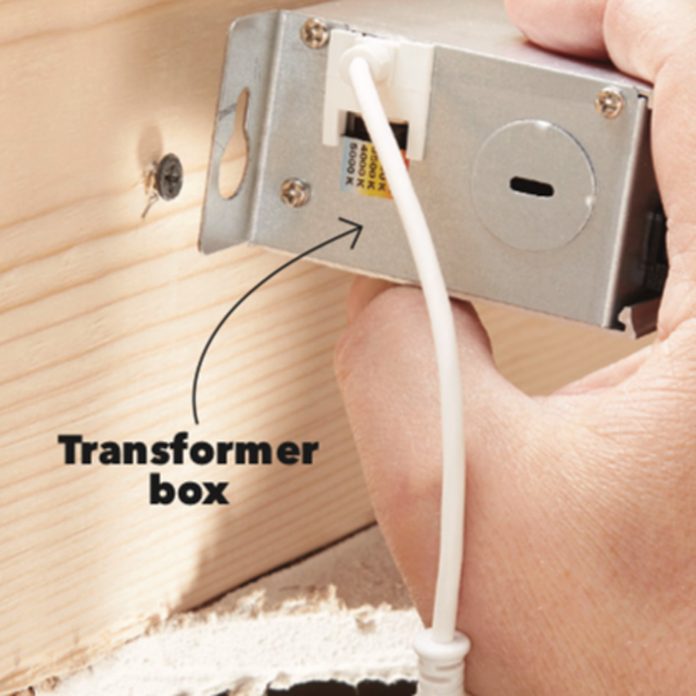
Hold the transformer box against the joist and mark the keyholes. Set the box aside and install the ii screws. Hang the box, and then tighten the screws with a screwdriver. Working infinite is limited, so hang the box directly higher up the hole.
Step 10
Connect all the transformers
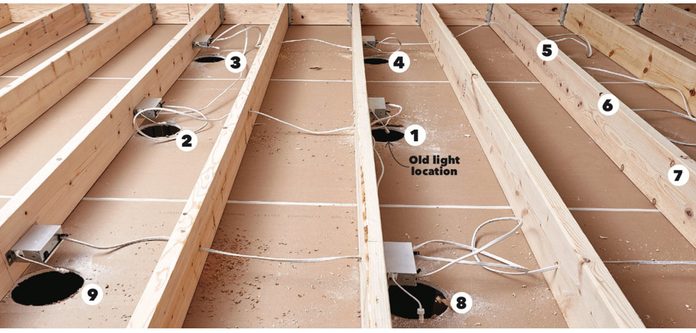
Connect power to each box and hang all the transformers. Each box has ability in and power out except for the terminal 1.
Stride xi
Connect the lights
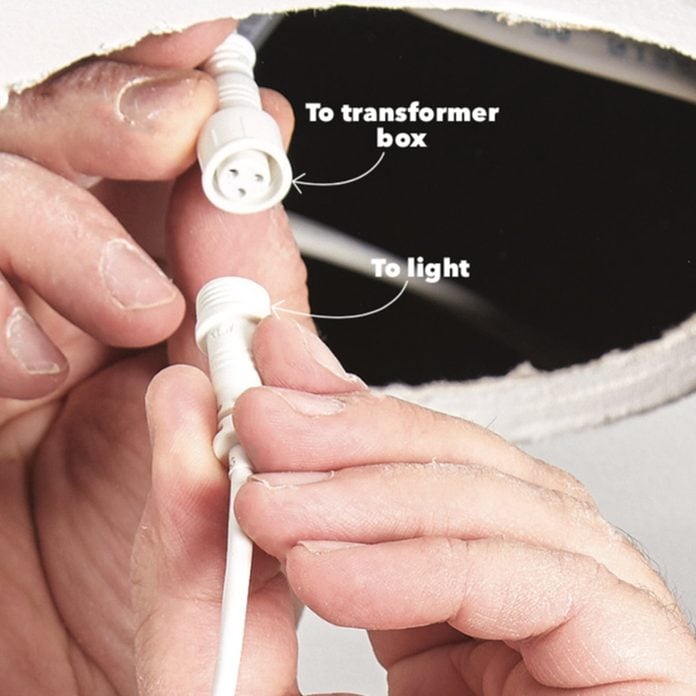
Plug the low-voltage cables from the lights into the cables from each transformer box. Set the desired color temperature using the switch on the side of each transformer box.
Pace 12
Snap in the lights
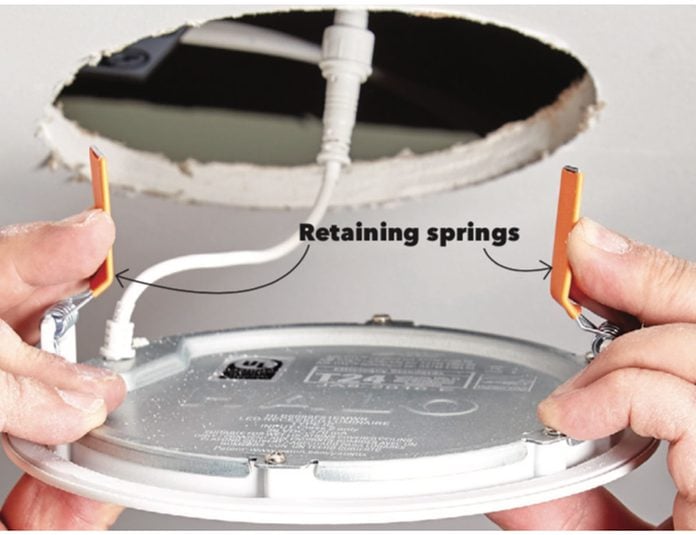
Press the retaining springs upward and pop each low-cal into identify, and and so switch the ability dorsum on at the breaker panel. If y'all want to alter the color temperature after the lights are installed, advisedly pull downward on the light's flange to remove it, keeping your fingers articulate of the mousetrap-like retaining springs!
Originally Published: February 22, 2022
Source: https://www.familyhandyman.com/project/how-to-install-low-profile-led-lights/
Posted by: middletonmusinare.blogspot.com


0 Response to "How To Install Replacement Led Recessed Lights"
Post a Comment